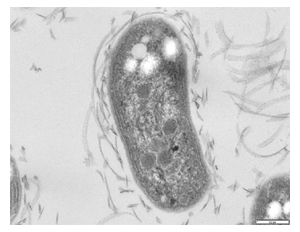Nitrobacter
Nitrobacter is a genus of Gram-negative bacteria that plays a significant role in the nitrogen cycle, specifically in the process of nitrification. This genus is characterized by its ability to oxidize nitrite (NO2−) into nitrate (NO3−), a critical step in the nitrogen cycle that makes nitrogen available to plants in a form they can assimilate.
Characteristics[edit | edit source]
Nitrobacter species are obligate aerobes, requiring oxygen to perform their metabolic functions. They are also chemoautotrophs, deriving energy from chemical reactions while fixing carbon dioxide (CO2) from the atmosphere to fulfill their carbon requirements. The cells of Nitrobacter are typically rod-shaped and form pink colonies due to the presence of a pigment.
Ecology[edit | edit source]
Nitrobacter is found in a variety of habitats, including soil, freshwater, and marine environments. Its presence is crucial for the nitrification process, which is part of the larger nitrogen cycle. Nitrobacter competes with plants for nitrite in the soil, transforming it into nitrate, which is more readily absorbed by plants. This process also plays a vital role in aquariums and wastewater treatment plants, where the control of nitrogen compounds is essential for the health of aquatic life and the prevention of water pollution.
Nitrification Process[edit | edit source]
The nitrification process involves two main steps: 1. The oxidation of ammonia (NH3) to nitrite (NO2−) by bacteria such as Nitrosomonas. 2. The subsequent oxidation of nitrite to nitrate by Nitrobacter.
This two-step process is critical for converting ammonia, which can be toxic to many organisms, into nitrate, which can be used by plants to synthesize proteins and other essential compounds.
Research and Application[edit | edit source]
Research on Nitrobacter has focused on its role in the nitrogen cycle, its ecological impact, and its potential applications in agriculture and environmental management. For example, understanding the conditions that favor Nitrobacter activity can help in the development of more efficient fertilizers and in the management of wastewater treatment systems. Additionally, Nitrobacter is of interest in the study of biofiltration systems, where these bacteria can be used to remove nitrogen compounds from water, thus reducing pollution and improving water quality.
Challenges[edit | edit source]
One of the challenges in studying Nitrobacter is its sensitivity to environmental conditions, such as temperature, pH, and the presence of oxygen. These factors can significantly affect the rate of nitrification and the overall efficiency of Nitrobacter in natural and engineered systems.
Conclusion[edit | edit source]
Nitrobacter plays a crucial role in the nitrogen cycle, transforming nitrite into nitrate and thereby facilitating plant growth and the removal of toxic nitrogen compounds from the environment. Its study and application offer potential benefits for agriculture, environmental management, and the maintenance of aquatic systems.
Search WikiMD
Ad.Tired of being Overweight? Try W8MD's physician weight loss program.
Semaglutide (Ozempic / Wegovy and Tirzepatide (Mounjaro / Zepbound) available.
Advertise on WikiMD
|
WikiMD's Wellness Encyclopedia |
| Let Food Be Thy Medicine Medicine Thy Food - Hippocrates |
Translate this page: - East Asian
中文,
日本,
한국어,
South Asian
हिन्दी,
தமிழ்,
తెలుగు,
Urdu,
ಕನ್ನಡ,
Southeast Asian
Indonesian,
Vietnamese,
Thai,
မြန်မာဘာသာ,
বাংলা
European
español,
Deutsch,
français,
Greek,
português do Brasil,
polski,
română,
русский,
Nederlands,
norsk,
svenska,
suomi,
Italian
Middle Eastern & African
عربى,
Turkish,
Persian,
Hebrew,
Afrikaans,
isiZulu,
Kiswahili,
Other
Bulgarian,
Hungarian,
Czech,
Swedish,
മലയാളം,
मराठी,
ਪੰਜਾਬੀ,
ગુજરાતી,
Portuguese,
Ukrainian
Medical Disclaimer: WikiMD is not a substitute for professional medical advice. The information on WikiMD is provided as an information resource only, may be incorrect, outdated or misleading, and is not to be used or relied on for any diagnostic or treatment purposes. Please consult your health care provider before making any healthcare decisions or for guidance about a specific medical condition. WikiMD expressly disclaims responsibility, and shall have no liability, for any damages, loss, injury, or liability whatsoever suffered as a result of your reliance on the information contained in this site. By visiting this site you agree to the foregoing terms and conditions, which may from time to time be changed or supplemented by WikiMD. If you do not agree to the foregoing terms and conditions, you should not enter or use this site. See full disclaimer.
Credits:Most images are courtesy of Wikimedia commons, and templates, categories Wikipedia, licensed under CC BY SA or similar.
Contributors: Prab R. Tumpati, MD



